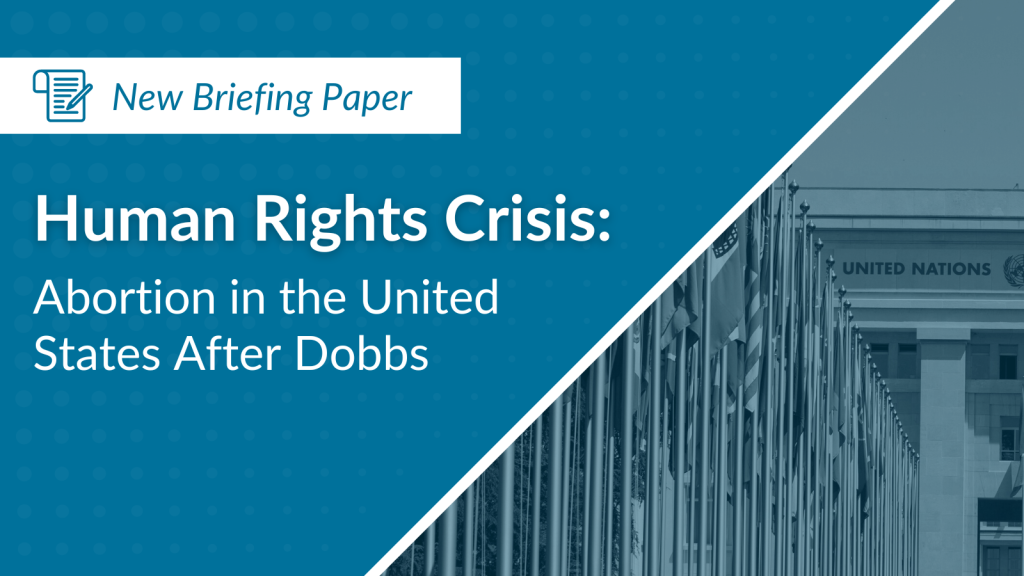Human Rights Crisis: Abortion in the United States After Dobbs

Executive Summary
Following the United States (US) Supreme Court decision in Dobbs v. Jackson Women’s Health Organization in June 2022, people in the US who can become pregnant are facing an unprecedented human rights crisis. In Dobbs, the Supreme Court overturned the constitutionally protected right to access abortion, leaving the question of whether and how to regulate abortion to individual states. Approximately 22 million women and girls of reproductive age in the US now live in states where abortion access is heavily restricted, and often totally inaccessible. This briefing paper details the intensifying human rights emergency caused by the decision, and discusses the ways that Dobbs contravenes the US’ international human rights obligations.
The consequences of the Dobbs decision are wide ranging. Restrictions on access to healthcare places women’s lives and health at risk, leading to increased maternal mortality and morbidity, a climate of fear among healthcare providers, and reduced access to all forms of care. Dobbs also enables penalization and criminalization of healthcare, with providers, patients, and third parties at risk of prosecution or civil suit for their involvement in private healthcare decisions. Relatedly, the decision opens the door to widespread infringement of privacy rights as digital surveillance is expanded to detect violations of new regulations. New bans also infringe on freedom of thought, conscience and religion or belief, restricting the ability of physicians to counsel patients and clergy to provide pastoral care to their congregants. Finally, the harms of Dobbs violate principles of equality and non-discrimination; they fall disproportionately on marginalized populations including Black, indigenous, and people of color; people with disabilities; immigrants; and those living in poverty.
By overturning the established constitutional protection for access to abortion and through the passage of restrictive state laws, the US is in violation of its obligations under international law, codified in a number of human rights treaties to which it is a party or a signatory. These human rights obligations include, but are not limited to, the rights to: life; health; privacy; liberty and security of person; to be free from torture and other cruel, inhuman, or degrading treatment or punishment; freedom of thought, conscience, and religion or belief; equality and non-discrimination; and to seek, receive, and impart information.
A version of this briefing paper was submitted to UN special procedures mandate holders in March 2023. The submission, cosigned by nearly 200 human rights, reproductive justice, and other concerned groups and individuals, requested urgent action from the UN mandate holders to examine the situation, engage with civil society, and call on the US to uphold its international human rights obligations.
Less than a year on from this catastrophic legal decision, it is now apparent that the consequences are even worse than feared. Women and girls in need of reproductive healthcare are being met with systematic refusals, onerous financial burdens, stigma, fear of violence, and criminalization. Thousands are being forced to remain pregnant against their will.
Part II of this briefing paper outlines the consequences of Dobbs on the fundamental human rights of women and girls, as well as the disproportionate impact it has on certain demographics made vulnerable by systemic oppressions. This factual summary includes input from physicians in various states as part of fact-gathering efforts conducted by a number of organizations involved in this submission. Part III discusses the ways in which Dobbs contravenes the US’ international obligations. Part IV sets forth our Conclusion and Calls to Action.
